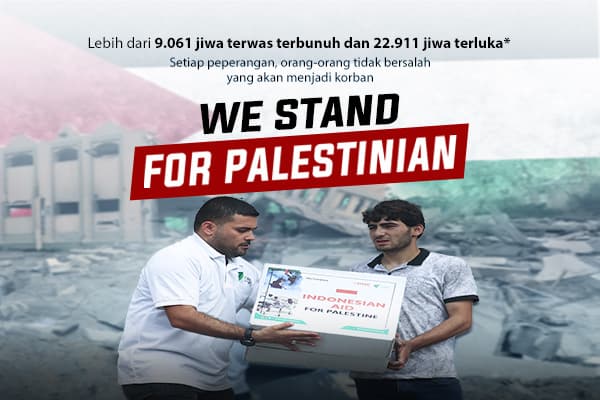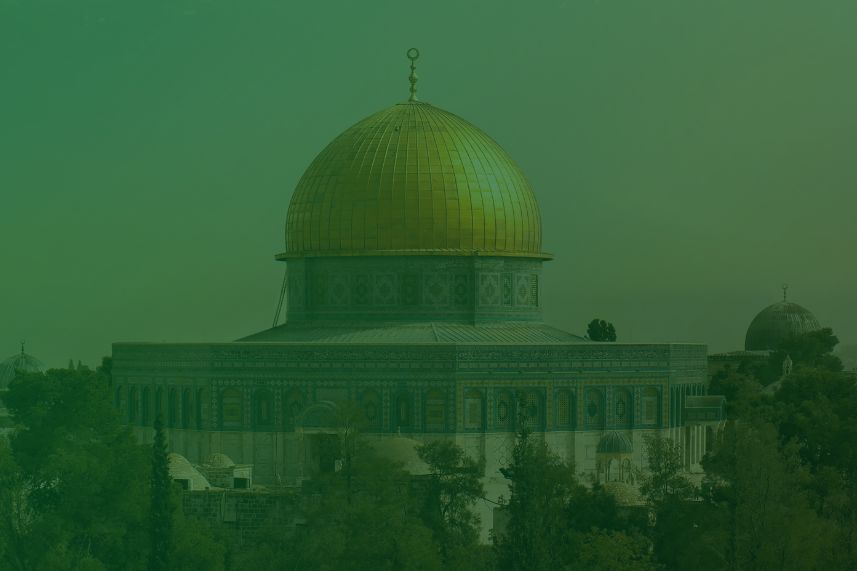Currently, many mosques in Palestine are severely damaged due to bombings by the Israeli military. Approximately 162 mosques have been attacked, with 52 completely destroyed and 110 severely damaged. Mosques play a crucial role in social life, serving as spaces for worship, social service activities, learning, and discussion. However, the current situation leaves no safe space for mosques in Palestine.
In the Gaza Strip, Muslims face difficulties in performing their prayers properly. They pray in refugee camps under the constant threat of bombing. In the West Bank of Palestine, where the territory is increasingly shrinking, there is also the largest mosque complex, a gathering place for worship in the House of Allah, namely Al-Aqsa Mosque. However, this mosque is difficult for the Palestinian residents to visit.
History of Mosques in Palestine: Al-Aqsa Mosque
Several tafseer books, such as Ath-Thabari, Ibnu Katsir, and Al-Qurthubi, mention that the angels were the first to build Al-Aqsa Mosque. They outlined and determined its location. However, the majority of scholars believe that it was Prophet Adam who first built Al-Aqsa Mosque.
During the time of Prophet Ibrahim’s mission in Syam, he renovated Al-Aqsa Mosque and raised its structure. At that time, Baitul Maqdis was ruled by a Canaanite King named Malki Shadiq, a ruler who adhered firmly to the teachings of monotheism. He accepted Prophet Ibrahim as a Messenger and his teachings.
Baca Juga: Pentingnya Mengenal Sejarah Islam di Era Modern serta Korelasinya dengan Pembebasan Palestina
The Beginning of Jewish Claims on Al-Aqsa Mosque
Al-Aqsa Mosque was renovated again during the time of Prophet Yaqub and further expanded by Prophet Sulaiman, making it larger and more majestic. During these times, the Jews began to claim that Prophet Sulaiman built a temple (Baitullah) for their people (the Jewish nation).
Al-Aqsa Mosque, rebuilt by Prophet Sulaiman, stood for 370 years until the Babylonians, led by Nebuchadnezzar in 587 BC, attacked the city of Baitul Maqdis and demolished Al-Aqsa Mosque. The ruins of Al-Aqsa Mosque were left untouched for a long time.
Over time, other nations (Persians, Greeks, and Romans) came to Baitul Maqdis. They built their places of worship within the area of Al-Aqsa Mosque’s ruins, placing various idols and statues according to their beliefs.
In 20 BC, the Roman leader Herod came to Baitul Maqdis and built a large building in the area of Al-Aqsa Mosque, named Basilica, signifying a place for leaders or kings.
The Jews, seeing this large building, claimed that the Romans had erected a new temple as a substitute for the one that had fallen. They considered this building as the second temple, and the one built by Prophet Sulaiman as the first temple.
Baca Juga: Sejarah Penjajahan Palestina: Jangan Ragu Mendukung Kemerdekaan Penuh
Mosques in Palestine During the Islamic Caliphate
Since the advent of Islam, Al-Aqsa Mosque has been one of the most important holy sites for Muslims. It is the place where Prophet Muhammad SAW ascended to heaven to receive the commandment for prayer.
Subḥānal-lażī asrā bi‘abdihī lailam minal-masjidil ḥarāmi ilal-masjidil-aqṣal-lażī bāraknā ḥaulahū linuriyahū min āyātinā, innahū huwas-samī‘ul-baṣīr(u).
“Glory be to Him who took His servant by night from the Sacred Mosque to the Farthest Mosque whose precincts We have blessed, to show him some of Our signs. He is the All-Hearing, the All-Seeing.” (QS. Al-Isra: 1)
Besides being the place of Prophet Muhammad’s ascension, Al-Aqsa Mosque was also the first qibla for Muslims before the Ka’bah in Mecca. This makes Al-Aqsa Mosque a sacred place for Muslims.
Umar bin Khattab, during his caliphate, rebuilt Al-Aqsa Mosque, which he called Masjid Qibli (direction of prayer). Subsequent caliphates saw many renovations to Al-Aqsa Mosque, strengthening and beautifying it, and adding new structures like towers and more.
Baca Juga: Dompet Dhuafa Konsisten Dukung Kemerdekaan Palestina!
Mosques in Palestine Severely Damaged by the Crusades
In 1099 AD, the Crusaders conquered Baitul Maqdis and Al-Aqsa Mosque suffered severe damage during the war. The mosque area was used as an armory and stable for the Crusader horses.
In 1187 AD, Salahuddin Al-Ayyubi, along with the Muslim army, recaptured Baitul Maqdis and expelled the Crusaders. Salahuddin Al-Ayyubi and his troops cleaned Al-Aqsa Mosque and restored it to its original condition.
Limited Friday Prayer Congregation at Al-Aqsa Mosque
Currently, Al-Aqsa Mosque, under Israeli control, has regulations for Palestinian residents. They are limited to only 5,000 worshippers for Friday prayers, monitored by Israeli soldiers, despite the mosque’s capacity of 50,000 people.
Restricted Age for Mosque Visitors in Palestine
Besides limiting the number of Friday congregants, Israel also imposes age restrictions for those allowed to visit Al-Aqsa Mosque during Ramadan. Only women of all ages, boys up to 12, and men over 55 years are allowed. Men aged 13-54 are prohibited from entering Al-Aqsa Mosque, while men aged 45-55 can enter with special permission.
Limited Visitation Days
Palestinians are only allowed to visit the mosque on Fridays, with a limited number of congregants. For Palestinians in the Gaza Strip, there are limited quotas for women over 50 and men over 55. They are only allowed to enter Al-Aqsa Mosque on specific days, namely Sundays and Thursdays.
Israeli authorities often take measures to control access to the mosque on crucial days in the Islamic calendar, such as during Ramadan or other significant days. This creates challenges for Muslims wishing to perform their religious practices and experience the profound spirituality of Al-Aqsa Mosque.
Baca Juga: Donasi Palestina, Namun Waspada Penipuan!
Helping the Palestinian People Fight
The brutality of the Zionist soldiers continues to escalate, threatening the lives of children in Gaza every minute. Buildings are destroyed by bombs and missiles, with public facilities like schools, hospitals, and mosques also targeted.
Generous friends, the victims need our support and help to alleviate their relentless suffering. Through your support and donations, Dompet Dhuafa will establish a Foodbank or a ready-to-serve kitchen to meet the nutritional needs of Palestinian survivors. We will prepare clean water facilities to meet the basic needs of the Palestinian people, set up logistics and ambulance shelters for health services to victims, and distribute medicines. Let’s help Palestine rise again by clicking the following link.




